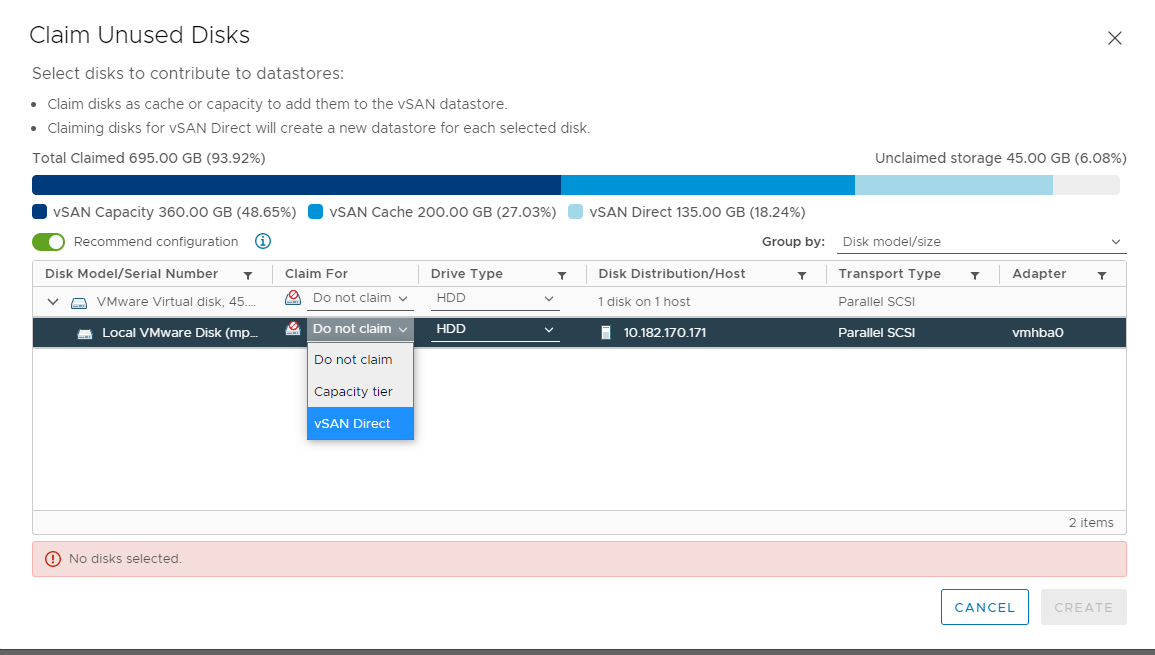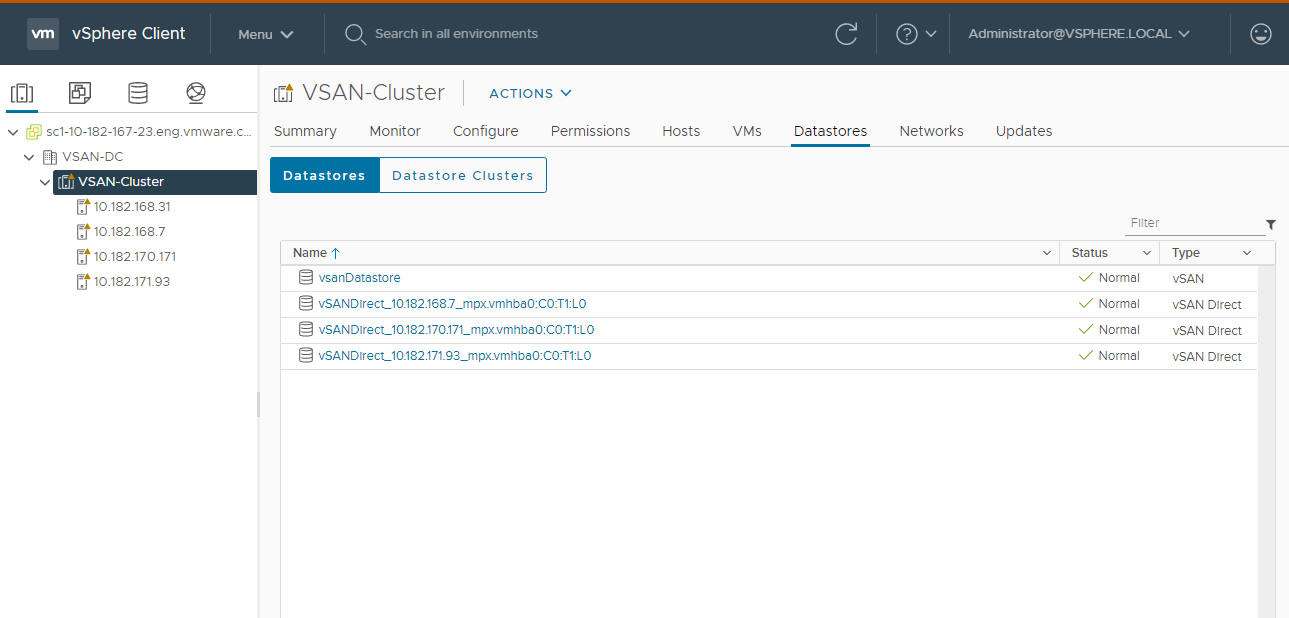vSphere IaaS control plane에서 상태 저장 서비스에 대한 전용 하드웨어 클러스터를 생성하려는 경우 vSAN Direct 데이터스토어를 사용할 수 있습니다. vSAN Direct는 ESXi 호스트에 로컬인 할당되지 않은 스토리지 디바이스에 배포하는 원시 데이터스토어입니다.
vSAN Direct에 대한 스토리지 디바이스 태그 지정
vSAN Direct는 vSAN 클러스터 내의 각 ESXi 호스트에 할당되지 않은 디스크가 필요합니다. 하지만 특정 환경에서 vSAN은 호스트의 모든 로컬 스토리지 디바이스를 자동으로 할당합니다. 디바이스를 일반 vSAN에는 부적합하고 vSAN Direct에는 사용할 수 있도록 설정할 수 있습니다.
프로시저
스크립트를 사용하여 vSAN Direct용 스토리지 디바이스에 태그 지정
또는 다음 스크립트를 사용하여 ESXi 호스트에 연결된 HDD 디바이스에 태그를 지정할 수 있습니다. 스크립트를 실행한 후 디바이스는 일반 vSAN에는 부적합하게 되고 vSAN Direct에 사용할 수 있게 됩니다.
#!/usr/bin/env python3
# Copyright 2020 VMware, Inc. All rights reserved.
# Abstract
#
# This script helps manage tagging of Direct Attached HDD disks
# on ESXi systems for vSAN Direct in preparation for a VCF deployment.
#
# It is expected to be used with ESX systems of version 7.0.1 or later.
#
import argparse
from enum import Enum
import logging
import sys
import os
import paramiko
import subprocess
import traceback
import ast
import getpass
from six.moves import input
from distutils.util import strtobool
from argparse import ArgumentParser
class ParseState(Enum):
OPEN = 0
DEVICE = 1
class RemoteOperationError(Exception):
pass
class EsxVersion:
def __init__(self, major, minor, release):
self.major = major
self.minor = minor
self.release = release
def __str__(self):
return '{}.{}.{}'.format(self.major, self.minor, self.release)
@staticmethod
def build(str):
tokens = str.split(b'.',3)
return EsxVersion(int(tokens[0]), int(tokens[1]), int(tokens[2]))
class StorageDevice:
def __init__(self, deviceId, isSSD, isVsanDirectEnabled):
self.deviceId = str(deviceId.decode())
self.isSSD = isSSD
self.isVsanDirectCapable = True
self.isVsanDirectEnabled = isVsanDirectEnabled
def __str__(self):
return '{}:\n\tIs SSD: {}\n\tvsanDirect enabled:{}'.format(
self.deviceId,
self.isSSD,
self.isVsanDirectEnabled)
@staticmethod
def strToBool(v):
return bool(strtobool(str(v.decode())))
@staticmethod
def build(deviceId, props):
vsanDirectEnabled = False
isLocal = StorageDevice.strToBool(props[b'Is Local'])
status = props[b'Status']
isOffline = StorageDevice.strToBool(props[b'Is Offline'])
isSSD = StorageDevice.strToBool(props[b'Is SSD'])
isBootDevice = StorageDevice.strToBool(props[b'Is Boot Device'])
deviceType = props[b'Device Type']
if deviceType == b'Direct-Access' and isLocal and (not isOffline) and (not isBootDevice) and status == b'on':
return StorageDevice(deviceId, isSSD, vsanDirectEnabled)
else:
print("Skipping device {}".format(deviceId))
return None
def parse_arguments():
"""
Parses the command line arguments to the function
"""
parser = argparse.ArgumentParser()
parser.add_argument('--hostname', dest='hostname',
help='specify hostname for the ESX Server', required=True)
parser.add_argument('--username', dest='username',
help='specify username to connect to the ESX Server', required=True)
parser.add_argument('--password', dest='password',
help='specify password to connect to the ESX Server', required=False)
return parser.parse_args()
def get_esx_version(sshClient):
global logger
stdin_, stdout_, stderr_ = sshClient.exec_command('vmware -v')
exit_status = stdout_.channel.recv_exit_status()
if exit_status != 0:
logger.error('Command exited with non-zero status: %s' % exit_status)
logger.error('Error message: %s' % stderr_.read())
raise RemoteOperationError('Failed to determine ESX version')
output = stdout_.read()
tokens = output.split()
if len(tokens) < 3:
raise RemoteOperationError('Invalid ESX Version - %s', output)
return EsxVersion.build(tokens[2])
def check_esx_version(esxVersion):
return esxVersion.major >= 7 and esxVersion.minor >= 0 and esxVersion.release >= 1
def query_devices(sshClient):
global logger
stdin_, stdout_, stderr_ = sshClient.exec_command('esxcli storage core device list')
exit_status = stdout_.channel.recv_exit_status()
if exit_status != 0:
logger.error('Command exited with non-zero status: %s' % exit_status)
logger.error('Error message: %s' % stderr_.read())
raise RemoteOperationError('Failed to query core storage device list')
output = stdout_.read()
# Build the device list from the output
return create_device_list(output)
def create_device_list(str):
devices = []
deviceId=""
deviceProps={}
parseState = ParseState.OPEN
for line in str.splitlines():
if parseState == ParseState.OPEN:
if line.strip():
deviceId=line.strip()
parseState = ParseState.DEVICE
elif parseState == ParseState.DEVICE:
if line.strip():
props = line.strip().split(b':',1)
deviceProps[props[0]] = props[1].strip()
else:
if deviceId:
device = StorageDevice.build(deviceId, deviceProps)
if device:
devices.append(device)
else:
logger.debug("Skipping device {}".format(deviceId))
deviceId=""
deviceProps={}
parseState = ParseState.OPEN
if deviceId:
device = StorageDevice.build(deviceId, deviceProps)
if device:
devices.append(device)
return devices
def tag_device_for_vsan_direct(sshClient, deviceId):
global logger
logger.info("Tagging device [{}] for vSAN Direct".format(deviceId))
command = "esxcli vsan storage tag add -d " + deviceId + " -t vsanDirect"
stdin_, stdout_, stderr_ = sshClient.exec_command(command)
exit_status = stdout_.channel.recv_exit_status()
if exit_status != 0:
logger.error('Command exited with non-zero status: %s' % exit_status)
logger.error('Error message: %s' % stderr_.read())
raise RemoteOperationError('Failed to tag device [{}] for vSAN Direct'.format(deviceId))
logger.info('Successfully tagged device [{}] for vSAN Direct'.format(deviceId))
def untag_device_for_vsan_direct(sshClient, deviceId):
global logger
logger.info("Untagging device [{}] for vSAN Direct".format(deviceId))
command = "esxcli vsan storage tag remove -d " + deviceId + " -t vsanDirect"
stdin_, stdout_, stderr_ = sshClient.exec_command(command)
exit_status = stdout_.channel.recv_exit_status()
if exit_status != 0:
logger.error('Command exited with non-zero status: %s' % exit_status)
logger.error('Error message: %s' % stderr_.read())
raise RemoteOperationError('Failed to untag device [{}] for vSAN Direct'.format(deviceId))
logger.info('Successfully untagged device [{}] for vSAN Direct'.format(deviceId))
def get_vsan_info_for_device(sshClient, deviceId):
global logger
command = "vdq -q -d {}".format(deviceId)
stdin_, stdout_, stderr_ = sshClient.exec_command(command)
exit_status = stdout_.channel.recv_exit_status()
if exit_status != 0:
logger.error('Command exited with non-zero status: %s' % exit_status)
logger.error('Error message: %s' % stderr_.read())
raise RemoteOperationError('Failed to query vsan direct status on device [%s]' % deviceId)
output = stdout_.read()
return ast.literal_eval(str(output.decode()))
def update_vsan_direct_status(sshClient, devices):
for device in devices:
vsanInfo = get_vsan_info_for_device(sshClient, device.deviceId)
device.isVsanDirectEnabled = vsanInfo[0]['IsVsanDirectDisk'].strip() == "1"
device.isVsanDirectCapable = vsanInfo[0]['State'].strip() == 'Eligible for use by VSAN'
def getVsanDirectCapableDevices(devices):
selectDevices = []
# Cull devices incapable of vSAN Direct
for device in devices:
if device.isVsanDirectCapable:
selectDevices.append(device)
return selectDevices
def print_devices(devices):
print("Direct-Attach Devices:")
print("======================")
iDevice = 0
for device in devices:
iDevice = iDevice + 1
print ("{}. {}".format(iDevice, device))
print("======================")
def tag_devices(sshClient, devices):
for device in devices:
tag_device_for_vsan_direct(sshClient, device.deviceId)
def untag_devices(sshClient, devices):
for device in devices:
untag_device_for_vsan_direct(sshClient, device.deviceId)
def tag_all_hdd_devices(sshClient, devices):
hddDevices = []
for device in devices:
if not device.isSSD:
hddDevices.append(device)
if len(hddDevices) > 0:
tag_devices(sshClient, hddDevices)
def show_usage():
print ("===================================")
print ("commands: {tag-all-hdd, tag, untag}")
print ("\ttag <comma separated serial numbers of devices>")
print ("\tuntag <comma separated serial numbers of devices>")
print ("\ttag-all-hdd")
print ("=============")
def main():
global logger
logger.info('Tag disks for vSAN Direct')
try:
# Parse arguments
args = parse_arguments()
# 1. Setup SSH connection to ESX system
sshClient = paramiko.SSHClient()
sshClient.load_system_host_keys()
sshClient.set_missing_host_key_policy(paramiko.AutoAddPolicy())
passwd = args.password
if passwd == None:
passwd = getpass.getpass(prompt='Password: ')
logger.info('Connecting to ESX System (IP: %s)' % args.hostname)
sshClient.connect(args.hostname, username=args.username, password=passwd)
# version check
esxVersion = get_esx_version(sshClient)
print('ESX Version on {} is {}'.format(args.hostname, esxVersion))
logger.info('Checking ESX Version...')
if not check_esx_version(esxVersion):
raise Exception('ESX Version must be 7.0.1 or greater')
print ('This script helps tag direct-attached disks for vSAN Direct on ESX')
print ('Note: Only disks of type HDD are supported at this time.')
print ()
print ("For help, type help")
show_usage()
while True:
# get device list
print("Querying devices...")
devices = query_devices(sshClient)
# update devices with vSAN Direct status
update_vsan_direct_status(sshClient, devices)
# cull device list
selectDevices = getVsanDirectCapableDevices(devices)
# List the devices for the user to see
print_devices(selectDevices)
# find out what the user wants to do to these devices
args = input('Command> ').split()
if len(args) == 0:
break
cmd = args[0]
if cmd == 'q' or cmd == 'quit' or cmd == 'exit':
break
elif cmd == 'help':
show_usage()
elif cmd == 'tag-all-hdd':
print("Tagging all HDD devices...")
tag_all_hdd_devices(sshClient, selectDevices)
elif cmd == 'tag' or cmd == 'untag':
chosenDevices = []
if len(args) > 1:
serials = args[1].split(',')
for serialStr in serials:
serial = int(serialStr)
if serial < 1 or serial > len(selectDevices):
raise Exception("Error: Serial {} is out of range".format(serial))
chosenDevices.append(selectDevices[serial-1])
if len(chosenDevices) == 0:
print("No devices specified")
continue
if cmd == 'tag':
print("Tagging devices...")
tag_devices(sshClient, chosenDevices)
else:
print("Untagging devices...")
untag_devices(sshClient, chosenDevices)
else:
print ("Error: Unrecognized command - %s" % cmd)
except paramiko.ssh_exception.AuthenticationException as e:
logger.error(e)
sys.exit(5)
except Exception as e:
logger.error('Disk tagging failed with error: %s' % e)
logger.error(traceback.format_exc())
sys.exit(1)
finally:
# Close SSH client
try:
sshClient.close()
except:
pass
# Set up logging
logging.basicConfig()
logger = logging.getLogger('tag-disks-for-vsan-direct')
if __name__ == "__main__":
main()
vSAN Direct 데이터스토어 생성
vSphere 관리자는 vSAN 데이터 지속성 플랫폼 또는 VM 인스턴스 스토리지와 같은 기능과 함께 사용할 vSAN Direct 데이터스토어를 설정합니다. 데이터스토어를 생성하려면 ESXi 호스트에 로컬인 할당되지 않은 스토리지 디바이스를 사용합니다.

